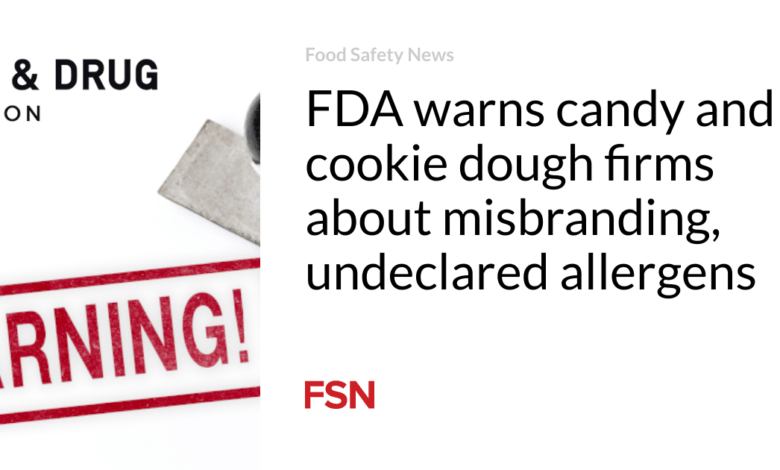FDA warns candy and cookie dough firms about misbranding, undeclared allergens

The Food and Drug Administration sends warning letters to entities under its jurisdiction as part of its enforcement activities. Some letters are not posted for public view until weeks or months after they are sent. Business owners have 15 days to respond to FDA warning letters. Warning letters often are not issued until a company has been given months to years to correct problems.
Big Island Candies Inc.
Hilo, HI
A food firm in Hawaii is on notice from the U.S. Food and Drug Administration (FDA) for violations of the Federal Food, Drug, and Cosmetic Act.
In a May 29 warning letter, the FDA described Big Island Candies Inc.’s Jan. 10 recall of Big Island Candies Makana Brownie Assortment Box after the firm discovered the box contained Milk Chocolate Covered Peanut Butter Brownies instead of Milk Chocolate Covered Macadamia Nut Brownies.
The printed label on the assortment box did not contain an allergen statement or ingredient declaration for peanuts. The firm became aware of the undeclared peanut after a consumer notified them that they experienced an allergic reaction to peanuts after consuming a brownie packed from the assortment box of Makana brownies. In documentation provided to the Office of Human and Animal Food Operations West Division 5 Recall Coordinator on Jan. 15, the firm indicated that Milk Chocolate Covered Peanut Butter brownies were unintentionally packed into the assortment box, which was labeled to contain brownies containing macadamia nuts. This product was manufactured on (redacted by FDA). They stated the recall was due to human error, namely, workers who were not paying attention and unintentionally packed a peanut butter brownie in the wrong box.
Misbranding:
Peanuts are considered a “major food allergen.” A food is misbranded if it is not a raw agricultural commodity and it is, or it contains, an ingredient that bears or contains, a major food allergen, unless either:
- The word “Contains,” followed by the name of the food source from which the major food allergen is derived, is printed immediately after or adjacent to the list of ingredients or
- The common or usual name of the major food allergen in the list of ingredients is followed in parentheses by the name of the food source from which the major food allergen is derived (e.g., “Whey (Milk)”), except the name of the food source is not required when either the common or usual name of the ingredient uses the name of the food source or the name of the food source appears elsewhere in the ingredient list (unless the name of the food source that appears elsewhere in the ingredient list appears as part of the name of an ingredient that is not a major food allergen).
The firm’s Big Island Candies Makana Brownie Assortment is misbranded because the finished product label fails to declare a major food allergen (peanuts).
Additional comments:
The firm’s facilities are subject to the Current Good Manufacturing Practice, Hazard Analysis, and Risk-Based Preventive Controls for Human Food regulation requirements. As such, the firm is required to identify and implement preventive controls to provide assurances that any hazard requiring a preventive control (e.g., undeclared allergens) will be significantly minimized or prevented and the food manufactured, processed, packed, or held by their facilities will not be adulterated or misbranded. The failure of the owner, operator, or agent in charge of a covered facility to comply with the preventive controls provisions of the CGMP & PC rule is prohibited.
The full warning letter can be viewed here.
Cookies-n-Milk LLC
McKinney, TX
A food firm in Texas is on notice from the U.S. Food and Drug Administration for violations of the Current Good Manufacturing Practice, Hazard Analysis, and Risk-Based Preventive Controls for Human Food regulation.
In an April 22 warning letter, the FDA described an Oct. 3 -19, 2023, inspection of Cookies-n-Milk, LLC’s ready-to-eat (RTE) cookie dough manufacturing facility in McKinney, TX.
FDA investigators determined that the RTE Peanut Butter Cup Edible Cookie Dough manufactured in their facility is misbranded because the finished product labels did not declare the major food allergen peanuts. The RTE Edible Cookie Dough, Peanut Butter Cup, is also misbranded because the product label fails to declare all the common or usual names of each ingredient.
After the inspection, the FDA investigator issued a Form FDA-483, Inspectional Observations, listing deviations found at the facility.
Some of the significant violations:
Hazard Analysis and Risk-Based Preventive Controls
1. The firm’s hazard analysis did not identify and evaluate all known or reasonably foreseeable hazards to determine whether there are hazards requiring preventive control for your RTE Edible Cookie Dough products, as required. Specifically:
a. They did not identify and evaluate undeclared allergens because of incorrect labeling as a known or reasonably foreseeable hazard to determine whether they require preventive control at the packaging/labeling step. Their facility manufactures, packages, and distributes RTE Edible Cookie Dough products with and without peanuts and other allergens — soy, milk, wheat. Therefore, allergens are a known or reasonably foreseeable hazard. A knowledgeable person manufacturing/processing food in your circumstances would identify allergens as a hazard requiring preventive control at the packaging/labeling step. Food allergen controls include procedures, practices and processes employed for labeling to ensure that all food allergens required to be stated are included on the label.
b. The firm did not identify and evaluate mycotoxins as a known or reasonably foreseeable hazard to determine whether they require preventive control. Their facility manufactures RTE edible cookie dough products containing peanut butter, which has been associated with mycotoxins such as aflatoxin. A knowledgeable person manufacturing/ processing food in their circumstances would identify mycotoxins as a hazard requiring preventive control in peanut butter and peanut butter-containing ingredients. Further, a facility that identifies raw materials and other ingredients that require a supply-chain-applied control, such as mycotoxins, must establish and implement a risk-based supply-chain program for those raw materials and ingredients. The supply-chain program must include using approved suppliers and conducting supplier verification activities. They do not conduct supplier verification activities for mycotoxins in peanut butter and peanut butter-containing ingredients.
Misbranding
The firm’s Cookies-n-Milk brand RTE Peanut Butter Cup Edible Cookie Dough, lot 3240, is misbranded because the finished product label fails to declare a major food allergen of peanuts. Specifically, they manufactured Cookies-n-Milk RTE Peanut Butter Cup Edible Cookie Dough, lot 3240 — containing the allergens soy, milk, wheat, and peanut — and placed this product into the preprinted labeled cup for the Cookies-n-Milk RTE Chocolate Chip Edible Cookie Dough containing soy, milk and wheat. The product was placed in incorrectly labeled cups, which did not list peanuts on the label. Peanuts are considered a major food allergen. A food is misbranded if it is not a raw agricultural commodity and it is, or it contains, an ingredient that bears or contains, a major food allergen, unless either:
• The word “Contains” followed by the name of the food source from which the major food allergen is derived, is printed immediately after or adjacent to the list of ingredients or
• The common or usual name of the major food allergen in the list of ingredients is followed in parentheses by the name of the food source from which the major food allergen is derived (e.g., “Peanuts”), except the name of the food source is not required when either the common or usual name of the ingredient uses the name of the food source or the name of the food source appears elsewhere in the ingredient list (unless the name of the food source that appears elsewhere in the ingredient list appears as part of the name of an ingredient that is not a major food allergen).
The firm’s Cookies-n-Milk brand Peanut Butter Cup Edible Cookie Dough Peanut product is misbranded because the product label fails to declare all the common or usual names of each ingredient used. The product is manufactured using milk powder (an allergen) and baking soda; however, the product label fails to declare these ingredients in the ingredient statement, although those ingredients are added as per the list of ingredients in the product formulation sheet. Furthermore, the firm directly adds salt as an ingredient to their Cookies-n-Milk brand Peanut Butter Cup Edible Cookie Dough product; however, salt is not declared as an added ingredient separate from the sub-ingredients of the margarine and peanut butter chocolate cups.
The full warning letter can be viewed here.
(To sign up for a free subscription to Food Safety News, click here.)
Source link




